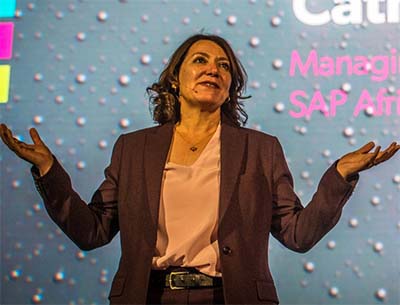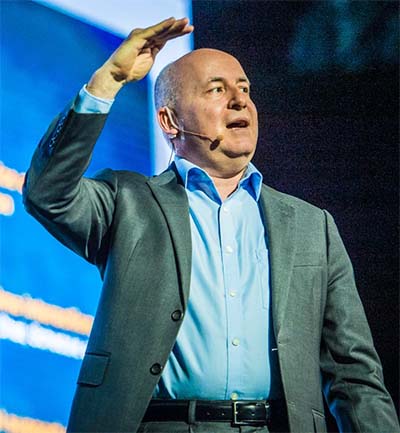Kathy Gibson is at Saphila in Sun City – We are living the experience economy – it is happening to all of us in the workplace or at home.
 “Experience matters,” says Cathy Smith, MD of SAP Africa.
“Experience matters,” says Cathy Smith, MD of SAP Africa.
She adds that the intelligent enterprise is at the heart of this experience economy.
“It brings everything together so that our customers can compete and thrive in the era of the best-run business.”
For SAP, this is an exciting time, she adds. “The SAP strategy has never been more clear. We have a roadmap of what the future holds.”
This strategy embraces customers and partners, Smith adds.
“Do you know that human beings can experience up to 26 different emotions at one time?” Smith asks. “And any one of those emotions can make or break an organisation.
“That’s why we talk about making a company work.”
 Andreas Heckman, executive vice-president and head of customer support services: digital business service at SAP, stresses that SAP’s mission is to work with customers on helping them to become intelligent enterprises.
Andreas Heckman, executive vice-president and head of customer support services: digital business service at SAP, stresses that SAP’s mission is to work with customers on helping them to become intelligent enterprises.
“It’s not just about technology any more,” he adds. “It is about how to become intelligent in an experience economy.”
Today, the CEO aims for company growth, the chief financial officer aims for profit, and the CIO has to achieve both of these goals while digitally transforming the organisation as well.
The challenges facing the CIO include fragmented architecture, new technology directions and managing the people culture.
“SAP is addressing the situation by promoting the intelligent enterprise, aiming to bring all of its core elements together,” Heckman says.
He adds that intelligent processes are not necessarily achieved with intelligent products. Regardless of what the processes are, they need to be supported by technology, though.
“At the end of the day, what we want to achieve with business processes is that they have embedded analytics so you don’t have to set up a parallel architecture in the company. You should have all the intelligent processes built into the product.”
The five lines of business: customer experience, employee engagement, digital core, network and speed management, and manufacturing and supply chain – are built around the core of intelligence technologies enabled by SAP Leonardo.
Heckman points out that SAP S/4 HANA is picking up fast, driven by the potential it offers across all the lines of business.
“The phrase customer experience is interesting,” Heckman says. He describes a study that asked companies what they think the customer experience they are providing is.
A massive 80% of companies really think they provide a great experience. “I thought that was a quite confident reply,” Heckman says.
“When they survey customers of the same companies, they go quit a different response.” In fact, just 8% of customers thought thy were getting a great experience.
He points out that it is so easy to deal with other companies that loyalty is relatively small. “If I have a great experience, I promote them, if I have a bad experience, I just go somewhere else.”
Social media means that any bad experiences are shared widely, with small events triggering huge backlash.
“The big question is how do you bring this knowledge into the technology? How do we bring it together from a really deep-down technical perspective.”
The fact is that we are in an experience economy – and SAP believes companies need to live in the X+0 world that brings together the operation and experience data.
This data is not just about customers, but product and brand experience as well, Heckman points out. Companies need to have access to all this data and to correlate it.
The digital platform will become the central home for all of the data, and companies will be able to work with it and do things they are not able to do so far.
“But do you realise that one of the biggest challenges is to become an intelligent enterprise ourselves?” he adds. “The problems that you are experiencing are the same that we are experiencing.”
Driving SAP to change the business is the fact that the business model is already transforming.
“So there are internal pressures pushing us to become an intelligent enterprise; but lots of external forces as well.”
The company’s business model is changing fundamentally, Heckman says. For instance cloud revenues are taking off while on-premise revenue is flat.
“Clearly this is a call for action and we have to take a serious look at what the intelligent enterprise mans, technically speaking,” Heckman says.
He says business processes have to be fundamentally changed. ‘The way we did this is via extensive interaction with internal customers and end users, with a focus on business processes, the business model, standardisation.”
The second issue is the architecture. “We had to get a handle on our architecture,” Heckman says. “There are a lot of broken process, a lot of legacy in the stack, a lot of outdate applications, different hyprescalers and more.
“This is the big problem we are all facing.”
The end goal is a much simplified and cleaned up stack, with standardised master data and embedded analytics, and data management into the process.
So far business benefits include better results in digital marketing, digital sales, customer retention, digital finance, digital spend management and digital human resources.
As the person in charge of the support organisation at SAP, Heckman admits that a few years back the company realised it could no longer afford to work with all of its customers as before.
We started thinking about what an intelligent version of ourselves looks like,” he says. “We realised we need to capture data, and come up with an intelligent version of what support used to be.
“So we come up next-generation support.”
This is the live support hat is required by live business, he says.
Already, 14% of customer interactions by South African customers are via expert chat rather than traditional support tickets, Heckman points out
This allows customer to resolve issues in just minutes rather than days. They can receive instant support, and also book time with technicians if that is more convenient.
In addition, artificial intelligence (AI) means that help can be embedded into the application as well.
Heckman adds that SAP is not finished with its transformation journey and intends to continue to evolved its customer support.
“2019 will be the beginning of the real inflexion point in customer support,” Heckman says. “Our lodestar is for you to not have to reach out to us anymore. We intend to predict the problems you face before you even realise you have them. We want to be able to send you the solution I the on-premise environment; or simply fix it if it is in the cloud environment.
“We think we are ready for prime time with this now.”
For customers that follow the vision, and become intelligent enterprise, the role of IT will change.
“In an on-premise world, all of you are looking at ALM, change management, technical monitoring,” Heckman says. “As we are moving more o cloud, and to hybrid landscapes, it is obvious that SAP Solution Manager is not the answer. So we are introducing a brand new cloud-based ALM offering for our customer with a specific focus on the Intelligent Suite.”
